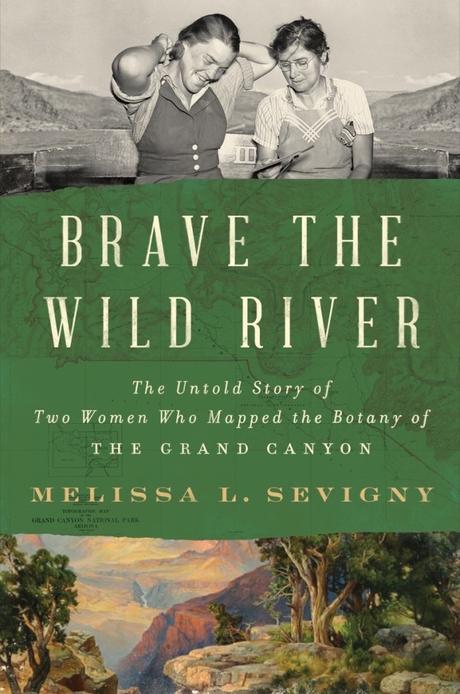
- Published: 2023
- Format: Audiobook, read by Elizabeth Wiley
- Genre: Nonfiction, nature, science, history
This book was recommended in last year’s Modern Mrs. Darcy Summer Reading Guide. It combines a lot of things I’m interested in: nature, history, feminism, and science. I also really like journey/adventure nonfiction, like Into the Wild, The Salt Path, Wild and Braving It. I’m a big fan of books about people who push themselves through travel and exploration. And I’m a big fan of books about the many women who have made an impact that has not been recognized.
In this book, Sevigny describes the expedition of two women in 1938 to explore the Grand Canyon and catalog its plant life. At this time the Colorado River was one of the wildest parts of the country, and many of the people who set out to explore it never came back. Elzada Clover and her younger colleague Lois Jotter were struggling to establish their careers in botany at the University of Michigan. When Clover met a rafting guide in Arizona, she planned a trip to be the first women to survey the plants by traveling the entire river.
I love nonfiction that combines history, travel, and interesting personalities, and this book delivered all of those. This is a perfect read for anyone interested in science and nature. At times it was a little too detailed for me in terms of the environmental history of the area, the practice of river rafting, and the different plant specimens that were collected. But while I may have glossed over some of those details while listening, it was all important to telling a comprehensive story. Like all the best historical accounts, there’s no one story line here. Sevigny spends a good amount of time on Clover’s and Jotter’s personal and professional lives, and I was particularly interested in the way botany was generally approved as a “women’s science” until it involved actual work outdoors. Clover and Jotter traveled through one of the most dangerous parts of the country, while at the same time dealing with the sexism of their companions and particularly the press. For example, the media treated their presence on the expedition as a lark or as something scandalous, rather than to further science. The women were expected to make every meal while also sharing many of the other responsibilities of their male counterparts. None of this will surprise readers, but it’s a fantastic story.
Sevigny describes how much these women accomplished during the journey and afterwards, while at the same time emphasizing how much their knowledge and strength were downplayed by others. Sevigny also focuses on the personal growth of Clover and Jotter, as they endure hardship and danger, and the journey leaves them changed forever. Neither of them were trained in river expeditions, and their story had some heart-stopping moments.
This is a book I’ve already recommended to friends, and I’m sure will be one of my favorite nonfiction reads of the year. There was so much information in this book, I probably would have absorbed more if I was reading it rather than listening, plus I expect the print version has some fantastic photos. You can learn more about these pioneering scientists at Scientific American and Atlas Obscura.
The author is actually speaking at my local library next week and I look forward to hearing her and learning more about her research.

